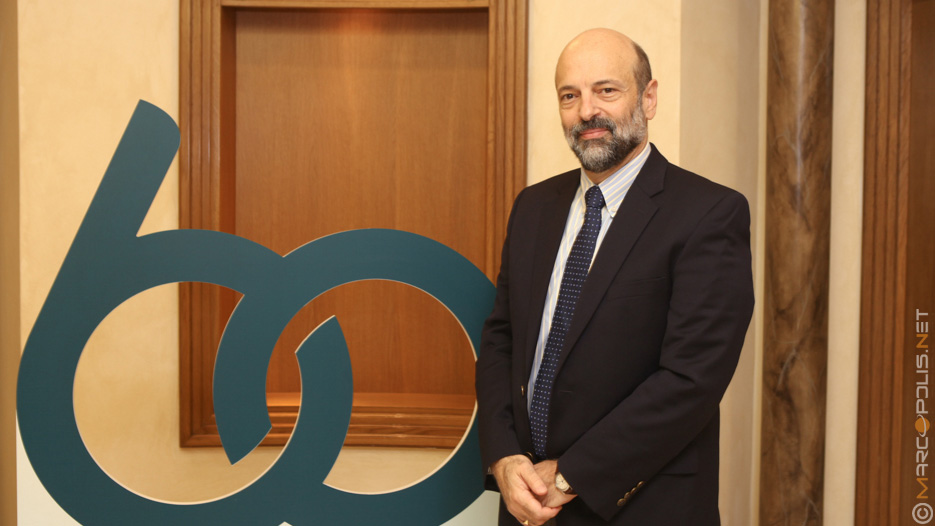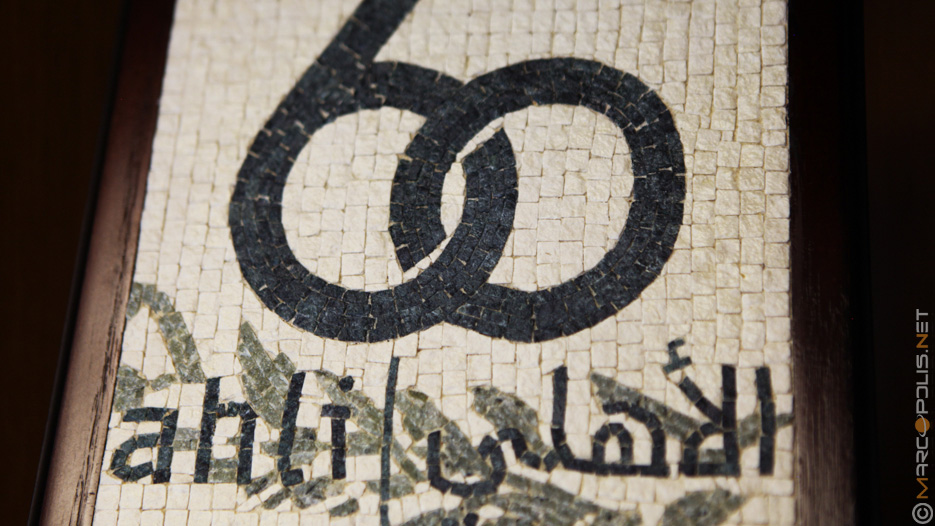Jordan Ahli Bank, A Leader with SMEs in Jordan
2015 has been a fantastic opportunity to clean, build and renew Jordan Ahli Bank.
Interview with Dr. Omar Razzaz, Chairman of Jordan Ahli Bank

Give us your evaluation of the banking sector in Jordan at the end of 2015.
The banking sector in Jordan has been very robust, particularly in light of regional turmoil. I think this is a testament to the strength of the Kingdom’s banking sector, to the monetary policy of the country and to the overall stability of Jordan as a people, as a regime and as a monarchy. All of these aspects are nested into each other. We have a very stable banking sector; we have not had a single incident or major failure in the last four or five years, whilst countries around us have unfortunately been burning up. In short, it is a very stable sector. It has been growing and all of the indicators are moving in the right direction. There have been major improvements in corporate governance: the Central Bank has been extremely effective in creating the right incentives for better corporate governance, and it has also been pushing for financial inclusion, so many more small- and medium-sized enterprises are getting involved in the financial sector and thus reaching customers who otherwise would have been unreachable by banks. There is also a national program in Jordan for financial literacy targeting youth and women. Jordan Ahli Bank is very active in this sense. The risks that local banks face are decreasing as they become more diversified, because there are more and more people depositing, and there are more and more companies that are benefiting from banking services in Jordan.
Coming back to what you mentioned about the inclusion of SMEs in the financial sector, we have heard that it is still lacking that inclusion and that there is a greater need for the banking sector to look at local investments.
Absolutely. The SME problem is a worldwide problem: it is called the “missing middle.” Microfinance is available and corporate finance is also available, but how do you work with the small and medium enterprises? There has been a lot of progress made in Jordan. One of the main ingredients for a healthy SME sector is a credit bureau. On December 15, 2015, the credit bureau in Jordan was launched. One of the main pillars of a very healthy SME sector has been therefore addressed. Jordan Ahli Bank has been a leader with SMEs: it was the first bank to announce an SME program, the first to launch products specifically targeting SMEs, and it has continually expanded its SME portfolio. The bank is finding a lot of interest in the SME sector, but financial constraints are not the only thing that SMEs need to address: there is also technical assistance, training, identification of markets, and so on. With that in mind, Jordan Ahli Bank created its SME Academy. Individuals and small businesses can sign up for free, either online or in person, and can join and attend classes that help them with bookkeeping, marketing, advertising, exports and other issues that small and medium enterprises face.

Apart from the “missing middle” what other challenges does the banking sector face—and Jordan Ahli Bank in particular?
The biggest challenge we are facing is the regional economy. Jordan is a small country; many of our exports used to go to Iraq and Syria and a lot of our trade was through Jordan to Iraq and Syria. Our link with Lebanon has all but vanished. This is the biggest challenge for the economy. His Majesty King Abdullah has continuously asked Jordanians to look at the challenges we face and see if we can turn them into opportunities. This is the only way that Jordan has survived and will continue to survive in this region. We have to accept the environment in which we live, but we also have to make sure that we not only survive, but prosper. For the last couple years, Jordan Ahli Bank has focused on improving its portfolio, expanding the bank’s market share and really cleaning up internally. We have recently installed new IT systems. We now have the best IT systems in the country, which will be officially launched in the next two or three months. We have done a lot of in-house portfolio cleaning and rebuilding. Just like restaurants on a Monday, when it’s a slow day, you clean up the kitchen – so 2015 has been a fantastic opportunity to clean, build and renew Jordan Ahli Bank.
What was Jordan Ahli Bank’s performance like in 2015? What is your current market share?
Our market share is around 5%. Jordan has two very large banks, five or six medium-sized banks, and then a number of very small banks. We are in the middle. Jordan Ahli Bank is a very resilient bank; our risk portfolio is really one of the best. We look very good when you look at the concentration of risk, credit, deposits, etc., as we are very well diversified. We have a very clear strategy going forward for the next five years. We can confidently say that we will be increasing our market share in the coming years, as the new IT systems will create an even more customer-centric product that can cater to a wide range of sectors and needs, whether on a retail level or at the SME level. That will be very hard to match. In addition, Jordan Ahli Bank has a number of outlets that no other bank has. For instance, we have a micro credit company, and no other bank has a micro credit company; we have a program that is aimed at women entrepreneurs; we have a leasing company and an investment company. Very few banks offer the range of services that we offer.
The before tax profit increased by 40% in 2015, compared to 2014. We inaugurated more branches. Our portfolio is better and our capital adequacy ratios are up. Our service feedback from our customers is very impressive…
How does the 2015 performance compare to the previous year?
The bank has moved up decisively. The before tax profit increased by 40% in 2015, compared to 2014. We inaugurated more branches. Our portfolio is better and our capital adequacy ratios are up. Our service feedback from our customers is very impressive, as are our internal dynamics and company culture. We have recently had a change in management, which went very smoothly and is really reenergising our staff. Ultimately, even at times like these, with so much regional turbulence, Jordan Ahli Bank’s customers are very loyal. We are a 60-year-old bank, and some of our customers have been with us for 40 or 50 years. We are also increasingly penetrating the youth segment. We have a very active social media network where people ask questions and interact about Jordan Ahli Bank. So we have real loyalty and a wide diversity of services, from micro credit to leasing, to SMEs and women-targeted services. Finally, 2015 has proved to be less risky; our portfolio is so diverse that we worry very little, even during times like these. For the country as a whole, it is worth noting that, even with all the regional instability, Jordan, thank God, has been unscathed. We are happy to say that the banking sector and Jordan Ahli Bank are a small part of that success story.
Are there any specific products or services that you are about to launch that you would like to promote?
The most important one is the new IT system itself, Temenos 24. Once this is launched by mid-year, it will create all sorts of services that are quite advanced by both Jordanian and regional standards.
In terms of community development, you are involved with the national program for financial literacy and you helped establish the SME academy and the program for women entrepreneurs. Could you tell us more about this?
If you look at what the bank is doing in CSR, we are really part of the story of bringing prosperity and better living conditions to people and communities throughout Jordan. Jordan Ahli Bank is one of the oldest banks established in Jordan. We just celebrated our 60th anniversary. From the beginning this has been a bank that distinguished between sustainable development and short-term economic growth, so even before the term CSR was coined, Jordan Ahli Bank was involved in all sorts of social activities and environmental philanthropic work in Jordan. If you look now at the sorts of activities that the bank is involved in, on the youth front, the bank is very involved with young entrepreneurs, supporting them through mentoring, scholarships, small seed funds to create companies, etc. With women, the bank has a unique program for women entrepreneurs that helps them break through some of the glass ceilings that exist in the market. In terms of the environment, the bank has a special department that helps small and medium companies switch from electric to solar energy. We also have an industrial park that we are developing in Jordan for green businesses; it will be an eco-sustainable industrial park that will be recycling water and solid waste. It will be using solar energy and really living up to the highest standards of industrial zones. We also do lots in terms of culture and the arts, because we strongly believe that these comprise a vital part of social welfare and prosperity. We have also opened many branches in remote governorates and small, isolated towns, not because they are money-making branches, but out of a sense of social responsibility that goes back to the issue of financial inclusion. Everybody should have access to an account and be able to deposit and borrow.
Lastly, what is your vision for the bank? Is there anything else you would like to highlight about the bank or the sector itself?
Our vision is for Jordan Ahli Bank to become one of the top banks in the Kingdom, which we aim to do by making the business of creating prosperity our core function. We are not interested in profit just for profit; we are interested in creating prosperity and having more people share in that prosperity.
FAIR USE POLICY
This material (including media content) may not be published, broadcasted, rewritten, or redistributed. However, linking directly to the page (including the source, i.e. Marcopolis.net) is permitted and encouraged.